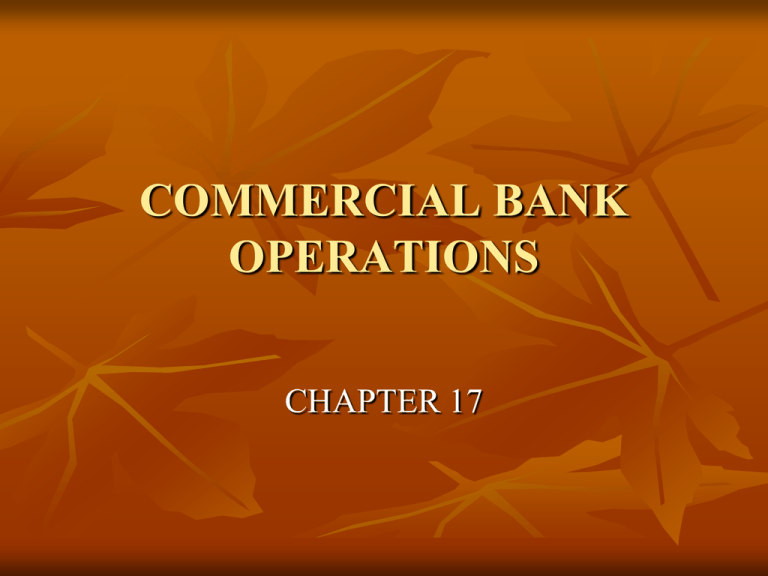
COMMERCIAL BANK
OPERATIONS
CHAPTER 17
BANK SOURCES OF FUNDS
A. Transaction Deposits; checking accounts
1. Commercial accounts non-interest bearing
2. Interest bearing checking accounts
B. Savings Deposits; pass-book savings
C. Time Deposits; short-term CDs
1. Managing Term risk
2. Penalties for early withdrawal
Dr. David P. Echevarria
ALL RIGHTS RESERVED
2
BANK SOURCES OF FUNDS
D. Money Market Deposit Accounts; providing
higher yields via T-bills, S-T securities
1. Provide better returns to customers with large
balances
2. Provide roll-up services for commercial clients
E. Eurodollar Borrowings; more by businesses
F. Bonds/Stock Issued by the Bank; raising
long-term capital
Dr. David P. Echevarria
ALL RIGHTS RESERVED
3
BANK USES OF FUNDS
A. Cash; transaction needs
B. Bank Loans; to create assets (loans to bank
customers)
1. Working Capital Loans; important source of S-T
liquidity for firms
2. Bridge loans for LBO, interim financing, etc
3. Lines of Credit
4. Importance of Prime rate
Dr. David P. Echevarria
ALL RIGHTS RESERVED
4
BANK USES OF FUNDS
C. Investment Securities; purchase of
government and corporate bonds
D. Lending in Federal Funds Market; lending
excess reserves
E. Eurodollar Loans; correspondent bank
relationships or foreign branches
Dr. David P. Echevarria
ALL RIGHTS RESERVED
5
MEETING RESERVE
REQUIREMENTS
A. Federal Funds: borrowing from other banks
(over-night)
B. Borrowing from the Federal Reserve Banks;
capital / reserve requirements
1. Cheapest source of lendable funds or to make up
short-falls in reserves
2. Increasingly a bank of last resort
Dr. David P. Echevarria
ALL RIGHTS RESERVED
6
OFF BALANCE SHEET
ACTIVITIES*
A. Loan Commitments (for LBO)
B. Standby Letters of Credit (especially for
Import/Export financing)
C. Swap Contracts (Interest rate and Currency)
* Generate fee income
Dr. David P. Echevarria
ALL RIGHTS RESERVED
7
EURIBOR
Euribor-EBF is an international non-profit making
association under Belgian law founded in 1999 with
the launch of the Euro and based in Brussels (56, Ave
des Arts, 1000 Brussels). Its members are national
banking associations in the Member States of the
European Union which are involved in the Eurozone.
4 Benchmarks
European Central Bank
A. The capital stock of the bank is owned by the central
banks of all 28 EU member states.
B. The primary objective of the European Central Bank,
as mandated in Article 2 of the Statute of the ECB, is
to maintain price stability within the Eurozone
C. The ECB has, under Article 16 of its Statute, the
exclusive right to authorize the issuance of euro
banknotes. Member states can issue euro coins, but
the amount must be authorized by the ECB
beforehand (upon the introduction of the euro, the
ECB also had exclusive right to issue coins).
The bank is based in Frankfurt, the largest financial centre in the
Eurozone. Its location in the city is fixed by the Amsterdam Treaty along
with other major institutions. In the city, the bank currently occupies
Frankfurt's Eurotower until its purpose-built headquarters are built.
Scheduled completion - 2014
European Banking Authority
A. The European Banking Authority (EBA) is a
regulatory agency of the European Union
headquartered in London, United Kingdom. Its
activities include conducting stress tests on
European banks to increase transparency in the
European financial system and identifying
weaknesses in banks' capital structures.[1] The
EBA was established on 1 January 2011, upon
which date it inherited all of the tasks and
responsibilities of the Committee of European
Banking Supervisors (CEBS)
HOMEWORK QUESTIONS
A. What are the principal sources of funds for banks?
B. What are the principal uses of funds for banks?
C. In what ways can a bank use the Federal Funds
market?
D. How does a bank create profit via the fractional
reserve system?
E. How does the Electronic Funds Transfer (EFT)
benefit the banking system?
Dr. David P. Echevarria
ALL RIGHTS RESERVED
13





